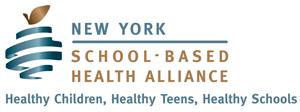COOPERSTOWN, N.Y. — Bassett Healthcare Network started offering telehealth services years before anyone had ever heard of COVID-19, but when the pandemic started, telehealth became a valuable and necessary service that continues to expand today.
Telehealth services at Bassett’s school-based health program were particularly important throughout the pandemic and will now benefit from a $5,000 Community Health Award from Excellus BlueCross BlueShield.
According to Practice Manager Jane Hamilton, RN, Bassett’s school-based health clinics completed 2,596 telehealth visits during 2021 and 1,221 during the 2021-2022 school year.
“It’s really just part of the toolbox now,” Hamilton says of telehealth. “It’s an important piece for improving access to care.”
Bassett will use the grant funding for the ongoing development of its telehealth services within the school-based health system. That includes buying tablets to replace the computers in exam rooms, allowing practitioners to move around easier and be more efficient, Hamilton says.
The Community Health Awards are a competitive funding process, and winners must use the funds to launch, expand, and sustain programs and services that promote health and advance health equity.
Bassett’s school-based health program’s telehealth services provide access for students to a variety of pediatric specialties, Hamilton says. Visits could range from a tele-psychiatry visit with a psychiatrist, a medication follow-up for ADHD or depression treatment, or ongoing management of a chronic illness like asthma.
Instead of parents having to bring their child to one of Bassett’s locations for an in-person visit with a doctor, their child instead goes to school as normal and simply reports to the school-based clinic at their appointment time.
From there, staff at the clinic connect with the doctor and tools such as electronic stethoscopes and otoscopes enable the doctor to remotely listen to the patient’s heart and lungs, check their ears, and so on, Hamilton explains.
“It really eliminates the barrier of access for that care,” she adds. Along with removing barriers on the patient’s end such as lack of transportation, offering telehealth services also reduces the amount of time it takes to receive care, Hamilton notes. Many pediatric specialists can have waiting lists that are months long because they only offer limited in-person hours at the school-based clinics, but that wait time is often shorter for a televisit.
Bassett first launched telehealth services about six years ago with a Health Resources and Services Administration grant used to provide or improve connectivity in the 17 school districts where it operates 21 school-based clinics. Services began with concussion clearances, required before students who experience a concussion can return to playing sports. “This was really the very first place we used telehealth,” Hamilton notes.
Services have grown since then to include a number of specialties including teledental services where the dentist can see digital radiographs taken during the televisit and schedule the appropriate in-person follow-up appointments. Bassett added telepulmonolgy in 2021. It allows students with rare types of asthma and similar pulmonary conditions to meet with specialist in Rochester. The grant will also allow Bassett to expand its program to include more pediatric specialties.
Bassett Healthcare Network provides services across a 5,600-square-mile region in upstate New York with five corporately affiliated hospitals, more than two dozen community-based health centers, 21 school-based health centers, two skilled-nursing facilities, and other health partners in related fields.
To continue reading, CLICK HERE.
By Traci DeLore (tdelore@cnybj.com)
Date:
